
Russian Think Tanks Enable the Kremlin’s Dangerous Delusions
Russian Think Tanks Enable the Kremlin’s Dangerous Delusions
When it comes to Russian propaganda, it is important to remember the so-called “analytical centers” that constitute it, including the Valdai Discussion Club, Foreign Policy Research Foundation and Russian International Affairs Council, among others. Unlike their Western counterparts, the task of Russian foreign policy experts is not to understand international processes but to rationalize Moscow’s activities.
The duties of Kremlin experts are comparable to those of propagandists. In fact, they create their own illusory reality designed to provide an alternative explanation for President Vladimir Putin’s irrational policies. However, such centers are often more dangerous than ordinary propaganda: For the purpose of this rationalization, they do not simply take their words from the pages of the Kremlin’s “manual” but create their own theories and ideological principles that then form the basis for Russian policy and serve as further justifications for aggression. In this, it is possible to distinguish the three fundamental and most dangerous ideological narratives created in the depths of the analytical centers and adopted by the Russian authorities.
First is the theory that the United States is responsible for the war in Ukraine, as instigating the conflict was the only way to protect its status as world hegemon. According to this theory, the US is inexorably losing global influence and cannot come to terms with it (Oborona.ru, April 11, 2022). In this regard, Washington is supposedly trying to “hold back the development of Russia and the rest of the world,” because, after a victory over Moscow, other countries will not dare “stand up to the hegemon” (YouTube, June 24).
At the very beginning of the Kremlin’s full-scale invasion, Russian “analysts” affirmed that, to achieve this goal, the West “consciously provoked Moscow to adopt a military solution” (Globalaffairs.ru, May 1, 2022). This narrative gradually evolved into the postulate that the West itself started the war (Тsargrad.tv, June 20) and even attacked Russia (YouTube, February 25). The logical consequence of this postulate is that support for Ukraine is beneficial only to the United States, but not to Europe, which “will not fight with Russia for the sake of the US” (YouTube, June 24).
Despite the dubious grounds of this theory, not only has it become mainstream in Russian propaganda, but it has also made appearances in the statements of the country’s highest officials. In particular, Russian State Duma Chairman Vyacheslav Volodin stated at the end of last year that “the United States is trying with all its might to hold back the development of other states in order to preserve its hegemony” (Dumatv.ru, December 5, 2022). Moreover, narratives about how international tensions are caused “by the stubborn resistance of the West, led by the US, to come to grips with the loss of its role as world hegemon,” turn up in the speeches of the head of Russian foreign intelligence, Sergei Naryshkin. According to Naryshkin, this is why “greater Eurasia” has become “a priority target for attacks by the American and British intelligence services” (Svr.gov.ru, June 1).
The second postulate holds that such a Western policy is neo-colonial and directed as much against Russia as the rest of the world (see EDM, February 22, 2022). According to Russian ideologues, the Kremlin today is “at the forefront of this struggle and is a sort of icebreaker that finishes off the residual ice of the neo-colonial system of Western domination” (Globalaffairs.ru, June 7). The concept of Russia as the flagship of the fight against neo-colonialism arose at the beginning of the full-scale invasion of Ukraine and was immediately taken up at the highest levels. Russian Foreign Minister Sergei Lavrov has often claimed that “the military operation of Russia in Ukraine contributes to freeing the world from the neo-colonial yoke of the West” (Kommersant, April 30, 2022). In June 2023, Putin also spoke of how “the monstrous neo-colonial system has ceased to exist” (Vedomosti, June 16).
The third postulate pushes the idea that, for Moscow, the war in Ukraine is supposedly existential, “where the existence of Russia is at stake” (Vz.ru, May 26). For the West, it is only essential to derive maximum benefit from the war, after which it will seek other ways to achieve this goal (YouTube, June 22).
Overall, it is clear that all these ideas contradict reality. The United States would think twice about embarking on a quest to strengthen its role in the world at the cost of serious destabilization in the current world order. Therefore, it was in Washington’s interests to try to prevent the war in Ukraine (Current Time TV, August 17, 2022). Moreover, the seizure of foreign territory is in no way an “existential” necessity for Russia. On the contrary, many European countries see Moscow’s policies as a threat to their very existence (Dw.com/ru, June 14).
As for the countries of the Global South, they are undoubtedly experiencing a period of rapid development; yet, they do not hide their desire to preserve ties to both Russian and Western markets. The need to choose between these markets, which Moscow is forcing on its partners (Aif.ru, November 9, 2022), hurts their economic interests. The former Indian ambassador to Russia, Pankaj Saran, stated bluntly that “for India, the conflict over Ukraine came at a bad time,” and, as a result, “development plans had to be adjusted” (Russiancouncil.ru, June 16).
The danger is that Putin himself as well as his inner circle seem to believe the “alternate reality” created by the “near-state” think tanks—a reality in which the “world majority” is unconditionally on their side and Europe will negotiate with them at any moment, “escaping the dictates of the US.” This credo convinces the Kremlin to continue its aggression believing in the inevitability of victory, which renders the Putin regime incapable of negotiations.


